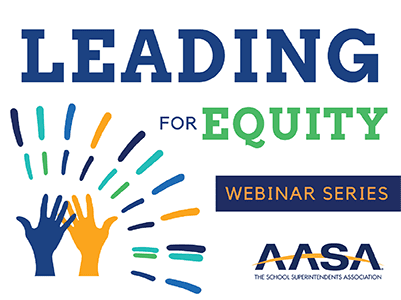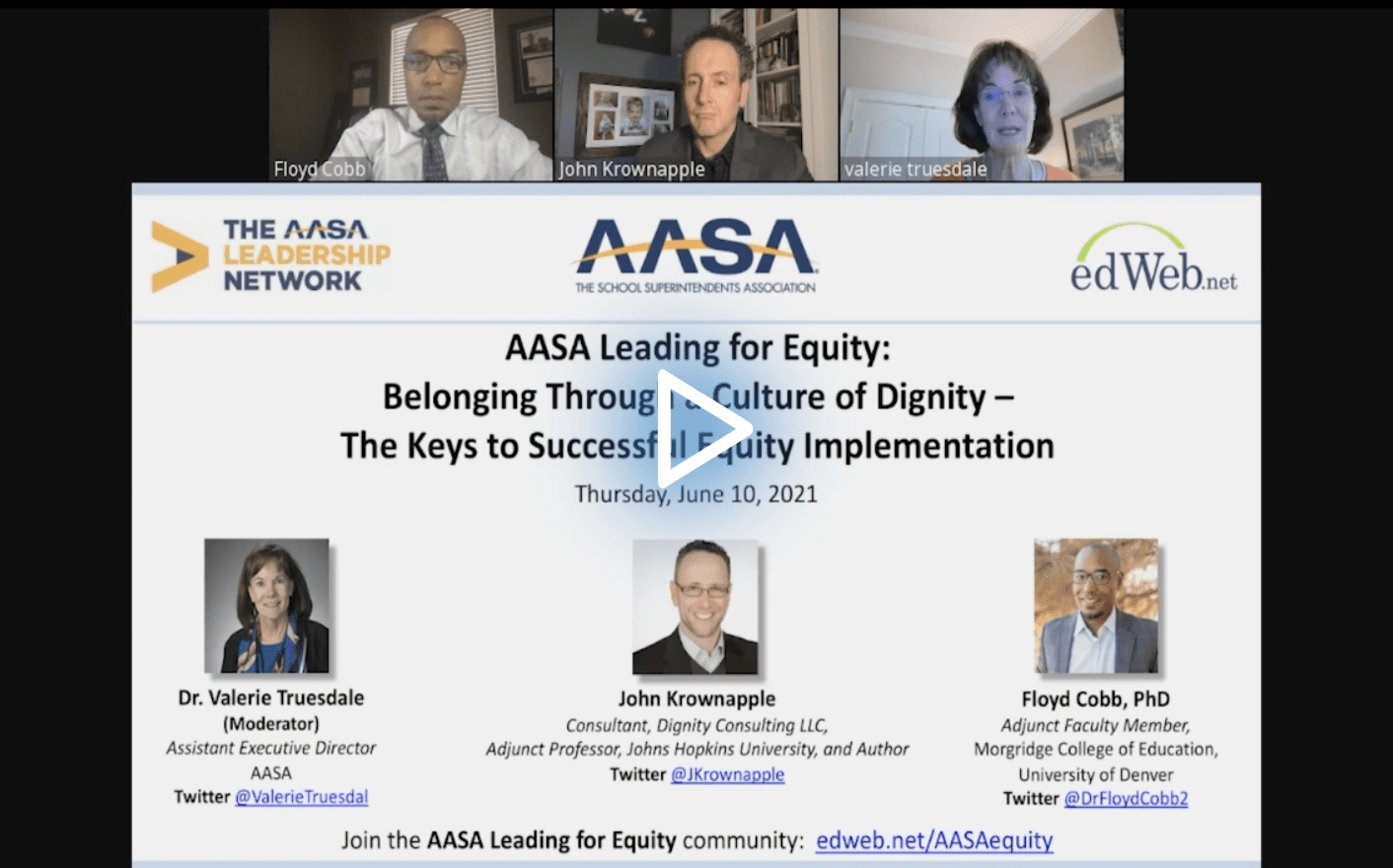Inclusion Is Not Enough: Creating Equity Through a Culture of Dignity
When something dramatic happens, like releasing student achievement scores, there’s often an outcry over educational inequities, and there are statements and calls to action to do better. Most of the time, though, the initial energy dissipates, and nothing changes. During an edWebinar hosted by AASA, The School Superintendents Association and AASA’s Leadership Network, John Krownapple and Floyd Cobb, Ph.D., authors of Belonging Through a Culture of Dignity: The Keys to Successful Equity Implementation, discussed why belonging and dignity are just as important as access and opportunity when it comes to educational equity.
First, school leaders need to understand the cycle of equity dysfunction. Typically, a catalyst sets off a call for change, then there are statements about what the school or community doesn’t stand for with a promise of change, and then there is usually a committee, which realizes they don’t have enough expertise, so an equity expert is hired. Unfortunately, the expert typically doesn’t have the authority or resources to effect real change, so nothing significant happens. And then the cycle continues. In addition, proposed equity initiatives often have problematic results, e.g., words without action or window dressing where there’s the appearance of caring.
Furthermore, when the committee or equity expert actually tries to implement change, they are frequently met with resistance. Often, a school will agree to adopt one or two aspects of a plan without fully embracing the movement. But when that one item disrupts the typical school day and doesn’t show immediate results, it’s abandoned.
Cobb and Krownapple said schools are often missing key elements needed to create an equity plan, including:
- Precise problem identification: Don’t lump all equity issues into one plan. Leaders need to create a different approach for each equity problem.
- Commitment to outcomes: Instead of abandoning a tactic because it doesn’t yield immediate results, schools need to keep iterating and keep working until they achieve the desired outcome.
- Iterative process: Again, schools should continuously assess what is and isn’t working, modify their plans, and try again.
Three Keys to Creating Equity
- A vision of inclusion: There is no common definition, but in their book, Cobb and Krownapple argue that while access is essential, access alone does not provide the opportunity for educational equity—there must also be belonging. Students can have access to a hostile environment or a bad experience where they have to change themselves to fit in. In other words, they have to become someone else in order to access the opportunity, which is not equity. When students also feel like they belong, like their differences are a value-add and they have co-ownership of the opportunity, then there is the potential for true inclusion.
- Assess the climate for belonging: It’s not enough to say all students and staff belong—they need to feel it at every level (interpersonal, institutional, and instructional).
- Take action to honor dignity: We’re all born with dignity, but it’s vulnerable and can be harmed. We don’t all experience the same harm to dignity others do, but we can understand it. We can choose to honor or violate a person’s dignity with every action.
The presenters warned there is often backlash against equity initiatives. But parents don’t want their children to feel as if they are being devalued, and that is the same thing everyone involved in these initiatives wants. By focusing on acknowledgement of what has happened and holding the school accountable for its commitment to change, schools can create an environment where every student feels like they belong and can succeed.
This edWeb broadcast was hosted by AASA, The School Superintendents Association and AASA’s Leadership Network, providing premier professional learning for educational leaders.
Watch the edWebinar Recording Listen to the Podcast
About the Presenters
John Krownapple specializes in professional learning and organizational development focused on equitable change. Bringing with him over 15 years of experience as the coordinator of diversity, equity and inclusion for a school district of over 50,000 students, John has published numerous articles and is the author of the book Guiding Teams to Excellence with Equity: Culturally Proficient Facilitation (Corwin, 2017) and co-author of Belonging Through a Culture of Dignity: The Keys to Successful Equity Implementation (Mimi & Todd Press, 2019). John has served as a classroom teacher, curriculum specialist, and district administrator, and he is currently an adjunct professor at Johns Hopkins University and an educational consultant.
Floyd Cobb, Ph.D. has almost 20 years of experience spanning the P-20 educational continuum, holding roles as a teacher, school leader, district curriculum leader, and a statewide policy implementer. He holds a Ph.D. in curriculum and instruction from the Morgridge College of Education at the University of Denver. There, he is an adjunct faculty member and teaches courses on social inequality through the lenses of race, class, and gender.
In 2017, Floyd was awarded the Ruth Murray Underhill Teaching Award for excellence in teaching, which is given to one adjunct faculty member at the university. He has published numerous articles and book chapters and is the co-author of the book Belonging Through a Culture of Dignity: The Keys to Successful Equity Implementation, which focuses on dignity as a key component of equity implementation. He is also the author of Leading While Black, an autoethnography detailing his reflections on the Black experience in educational leadership.
About the Moderator
Dr. Valerie Truesdale joined AASA early in 2019 as the assistant executive director responsible for guiding leadership development services and programs. With years of experience in the superintendency and roles in instructional technology, she knows that AASA’s Leadership Network can be a substantial resource for school leaders trying to keep pace with the rapidly changing delivery of K-12 education.
Join the Community
Leading for Equity is a free professional learning community on edWeb.net for school and district leaders who face many challenges leading schools and driving school improvement for all students, especially now with COVID-19.
The AASA Leadership Network drives superintendent success, innovation, and growth, shaping the future of public education while preparing students for what’s next. We are the largest, most diverse network of superintendents in America. Passionate and committed, we connect educational leaders to the professional learning, leadership development, relationships, and partnerships they need to ensure a long career of impact.
The summary of this presentation was written by Stacey Pusey.
Stacey Pusey is an education communications consultant and writer. She assists education organizations with content strategy and teaches writing at the college level. Stacey has worked in the preK-12 education world for 20 years, spending time on school management and working for education associations including the AAP PreK-12 Learning Group. Stacey is working with edWeb.net as a marketing communications advisor and writer.






Comments are closed.